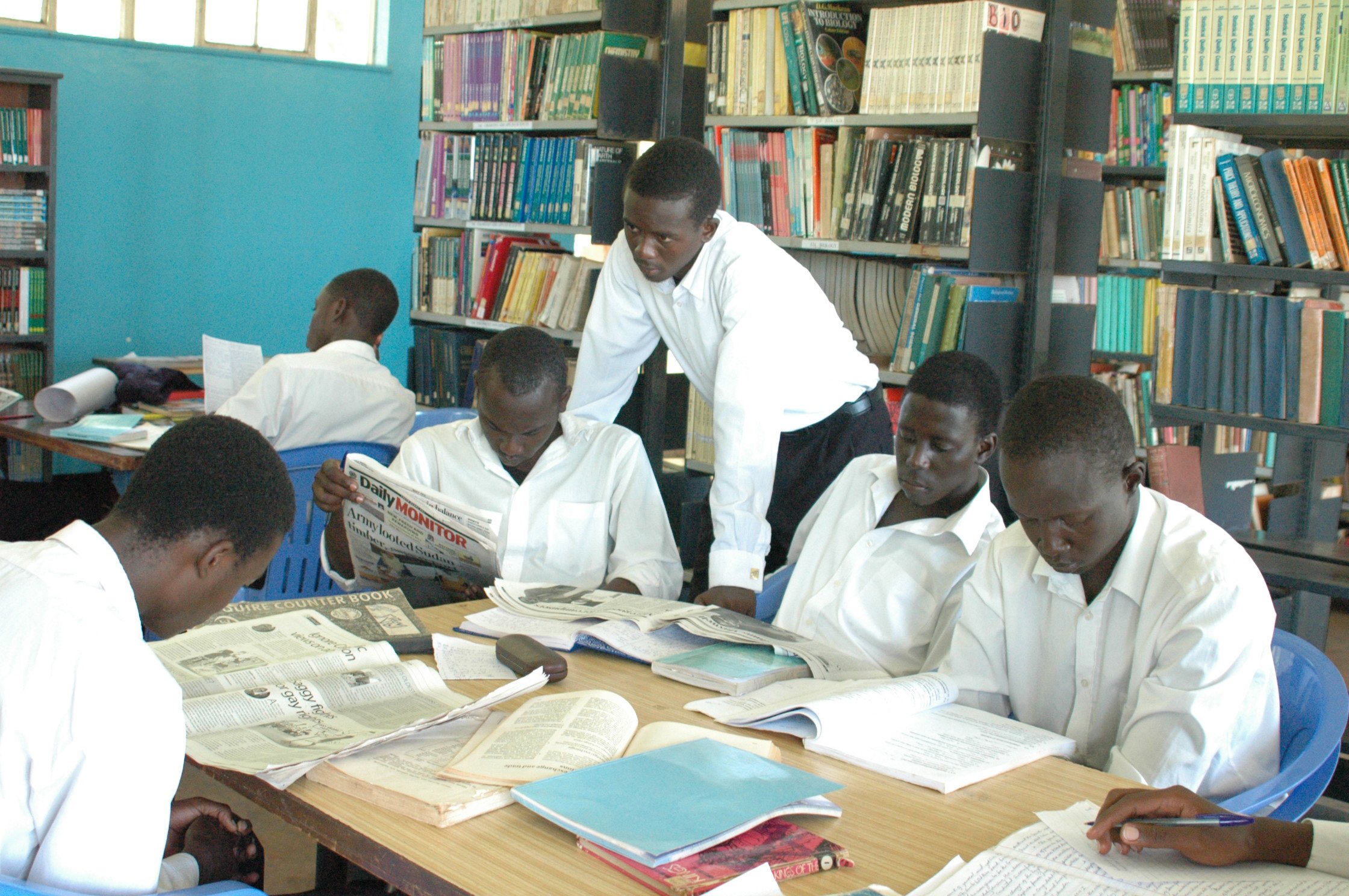School libraries receive much needed new stock of books

A well stocked library helps bridge the literacy gaps in the country by providing reading materials in schools and other institutions. PHOTO | FILE
What you need to know:
- The library initiative came as a result of collaborations between people with a common goal of bridging the literacy gaps in the country by providing reading materials to libraries in schools and other institutions.
The library at Aluka Secondary School, Affere Parish, Warr sub county in Zombo District is one of the school’s hotspot, favoured by students as their other source of knowledge.
The fairly old building was built for the school by volunteers from the UK, who were connected to the school by former archbishop Henry Luke Orombi, during his tenure as the Church of Uganda , according to Elisa Amadro, the school head teacher.
The library was however, last stocked with books 17 years ago in 2004, and this is evident on the beat-up books that have aged from years of handling and changing hands.
“Apart from being old, the books had also grown irrelevant in comparison to what students are learning now,” the school head adds.
When the school learnt about an opportunity to restock the school library with new and up-to-date books by the African Library Project that was being coordinated by Firm Foundation Education Trust, a community based organisation that aims at promoting literacy levels in West Nile and northern Uganda, they did not hesitate to seize the opportunity.
Getting the books
“We sent in our application, and we were expected to share about who we are as a school, its context, location, social-economic context, categories of users/ students that attend the school, the number of students we have, level of education we provide, the kind of books we were in most need of and why, whether we have an existing library or just starting from scratch, a work plan for one to three years, among others,” Amadro explains.
After about a month, they submitted their application and waited. After a period of almost six months, they received a call to receive the books. With a population of 641 (before the pandemic) the school received 991 books.
“The new books have breathed a breath of fresh air into the school library. Although I have not personally gone through all the books, a good number of them are in line with the new curriculum for Senior One that was recently rolled out. They are also mostly STEM books (Science, Technology, Engineering and Maths) and I know that when students finally come back to school, they will be very useful. So far, it is the teachers that are borrowing and reading some of them,” says the school head.

The Director of Cornerstone Secondary School in Arua City, Mr Peter Angundu, displays some of the 1,140 text books he received. PHOTO | FELIX WAROM OKELLO
Just like before, the students at Aluka Secondary School will be able to borrow the books whenever they need to by going with their school Identity cards to the library, leaving them with the librarian and picking books which they can keep for up to two weeks.
Amadro is also positive that since the new curriculum allows students out of class time, unlike the old curriculum where they spent almost 100 percent of the time in class, it will go a long way in enabling students have time to go to the library and find knowledge on their own, especially in the afternoon when classes end. The school is a government grant aided school that was started by the Church of Uganda.
At another school, Akoo Primary School in Oluvu parish, Kijomoro sub-county Maracha District, more than 1000 books were received, and as teachers are trying to forge a way to keep their pupils learning despite the lockdown, the books are sure coming in handy.
“We have an arrangement at the school where we have lessons for children in small numbers and before these lessons, I give them some of the books we received to read and they are enjoying them. All the books we received are readers and at the school, we have a temporary library in one of the rooms. Although this had some books, they were textbooks in line with the syllabus. The few we had that were not in line with the syllabus were in the Lugbara language. With the new books, children will be able to read, learn and improve their literacy levels,” Grace Angumaru, the books coordinator and teacher at the school shares, adding that being in a rural setting, they are experiencing low literacy levels.
Benefits
The library initiative came as a result of collaborations between people with a common goal of bridging the literacy gaps in the country by providing reading materials to libraries in schools and other institutions.
With low literacy levels reported in school-going children coupled with a poor reading culture, Dr Samuel Andema a literacy specialist and director of the Firm Foundation Education Trust, sought to collaborate with like-minded people.
“What I do has a lot to do with my background. My passion for promoting literacy and reading is deeply rooted in my identity, as a child who comes from a very poor and illiterate family background and knows the limitations of not knowing how to read and write,” Andema shares.
As a person who found passion and his career path in the books he read, it comes as no surprise that Andema has spent his time and energy promoting reading and literacy as a lecturer and out of class as the president of the Reading Association of Uganda in 2003, and as chairman of International Development Committee of the International Reading Association in 2006.
“So, this is part of the wider efforts to promote reading. It is an initiative we started in 2019 by establishing small but modern libraries that can reach out to young people and allow them to put hands on books. Although my focus is West Nile and northern Uganda, our partners of the Njuba Spelling Bee focus on the southern and western parts of Uganda,” Andema explains.
The process
This is an annual exercise that starts with announcing the opportunity to apply for books by interested institutions, which is normally communicated on radios, social media platforms, informal communication channels, and emails, among others.
Applicants are then given a time period between one to two months to make their applications. When these are received back, they are reviewed to ensure they meet the expectations and have had all the needed information submitted. After review, the applications are forwarded to the USA for consideration by partners there, who make book drives to mobilise the needed books, which are later sent to Uganda.
“In 2020, we received a container of books for 62 schools in Uganda. Out of these, West Nile received 21 slots for schools ranging from nursery, primary, secondary, tertiary and community based institutions. This year, we also received our second consignment in May. 42 schools in West Nile benefitted,” Andema adds.
He reiterates that although education institutions are being established, not a lot of thought is given to providing resources that are needed to improve learning outcomes and thus, believes that providing these reading materials will go a long way in enhancing and improving the learning outcomes and therefore the quality of people in the country.
Why read
“Reading exposes you to different cultures, takes you places, enriches one’s understanding of the world and helps one to live a better life. Unfortunately, not a lot of people are exposed to this reality. My belief is; teach a child to read and they will educate themselves,” the literacy specialist says.
He further clarifies what a library should be; not just a room or place where people go to only read but rather, a site where people readily have access to knowledge, information as well as a site for production of knowledge, where people have the desire to be and experience something new.
“What we are doing is to encourage schools and institutions to establish small modern libraries not only for keeping books but a place that is dynamic, where people engage with different activities such as storytelling, video games, cultural activities and acting among other activities. That is the kind of library we are promoting in this initiative,” says Andema.
To share this information, head teachers and librarians will receive training on how to set up a modern library and manage it when restrictions on gathering are relaxed. There will also be regular onsite visits to keep track of what is happening on ground and to have it documented.
Overall, more than 120 schools, institutions for higher learning and community institutions have benefited from the project with each school receiving an average of 1000 books.
Localisation of content
Although the books received are a wide range, even by level of education, there is a concern for localisation of their content and how relatable and relevant it is in the Ugandan context. To answer this, Andema notes that since a lot of the books received are determined by the need each school indicates in their application, it narrows down the problem of localisation of the content. He however, shares that they are alive to this concern.
“One of the challenges we so far have is that in most cases, schools want books that connect with our curriculum. We however, made a special request for STEM books that cut across curriculum, coupled with readers (novels, plays, dictionaries, encyclopaedias) but we still have a challenge of adopting information in these to our local curriculum and that is where the training comes in to support the beneficiaries,” he reveals.
The literacy specialist notes that it is important to know that children best learn by imitation and so, the best way to inspire children to read; for leisure and pleasure both at home and in school is for parents, teachers and people around to become readers.



